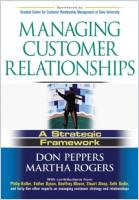
Why did I choose this resource?
I chose this resource to study the importance of customer relationships and how to manage them.
What did you learn from it?
I learned the steps and processes of IDIC and how to implement them. I also discovered the best metrics to use to demonstrate measurable results.
Key Knowledge
- Traits of Relationships
- Mutuality – pay attention and respond
- Interactivity – communication
- Iterative – grows or deteriorates
- IDIC – four steps of the customer relationship
- Step 1: Identify
- Definition – define customer identifier; name, address, phone number, or customer number
- Collection – gather data; credit card, loyalty card, web contact, or RFID tags
- Linking – associate individual customer’s data to his or her identifier
- Integration – data shapes all customer transactions or contacts
- Recognition – create mechanism to ensure customer is recognized and remembered during every contact
- Storage – save information in databases
- Updating – maintain current information
- Analysis – study customer data in context
- Availability – access to customer information
- Security – protect customer data from unauthorized persons
- Step 2: Differentiate
- Customers who cost less – higher margin and higher value
- Customers who use more high-margin products or services – higher value
- Other metrics include:
- needs
- buying patterns
- lifestyles
- other relevant characteristics
- Step 3: Interact
- Implicit and explicit assumptions
- Understandings
- Both parties must:
- identify themselves
- participate voluntarily
- accept the possibility of a change to their approach, understandings, or attitudes
- Step 4: Customize
- Four kinds of customization.
- Adaptive – customer may alter the product
- Cosmetic – offer color choices or personalization (name or company logo)
- Collaborative – company communicates with client to create precise products for the clients specific needs
- Transparent – provide unique products for a client without overtly stating the products are specialized.
- Four kinds of customization.
- Step 1: Identify
- Metrics and Measurements
- Customer equity – total lifetime value of a customer or of all customers
- Comprised of:
- Value equity – worth of the product or service to the customer
- Relationship equity – the tendency of the customer to stay with the brand
- Financial Value
- Cross-selling opportunities
- Lower costs
- Lower attrition
- Quicker cycle times
- Comprised of:
- Customer equity – total lifetime value of a customer or of all customers
How are you using what you learned?
I am using what I learned to evaluate our customer relationships and make changes or improvements where necessary.
Key Changes / Key Actions
- Evaluate each customers relationship with Anant
- Use IDIC
Source
- Name : Managing Customer Relationships
- Author : Don Peppers and Martha Rogers
- getAbstract.com: Link to Book



